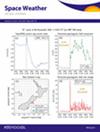Quantifying Uncertainties in the Quiet-Time Ionosphere-Thermosphere Using WAM-IPE
IF 3.7
2区 地球科学
引用次数: 0
Abstract
This study presents a data-driven approach to quantify uncertainties in the ionosphere-thermosphere (IT) system due to varying solar wind parameters (drivers) during quiet conditions (Kp < 4) and fixed solar radiation and lower atmospheric conditions representative of 16 March 2013. Ensemble simulations of the coupled Whole Atmosphere Model with Ionosphere Plasmasphere Electrodynamics (WAM-IPE) driven by synthetic solar wind drivers generated through a multi-channel variational autoencoder (MCVAE) model are obtained. Applying the polynomial chaos expansion (PCE) technique, it is possible to estimate the means and variances of the QoIs as well as the sensitivities of the QoIs with regard to the drivers. Our results highlight unique features of the IT system's uncertainty: (a) the uncertainty of the IT system is larger during nighttime; (b) the spatial distributions of the uncertainty for electron density and zonal drift at fixed local times present 4 peaks in the evening sector, which are associated with the low-density regions of longitude structure of electron density; (c) the uncertainty of the equatorial electron density is highly correlated with the uncertainty of the zonal drift, especially in the evening sector, while it is weakly correlated with the vertical drift. A variance-based global sensitivity analysis suggests that the IMF Bz plays a dominant role in the uncertainty of electron density. A further discussion shows that the uncertainty of the IT system is determined by the magnitudes and universal time variations of solar wind drivers. Its temporal and spatial distribution can be modulated by the average state of the IT system.利用 WAM-IPE 量化安静时电离层-热大气层的不确定性
本研究提出了一种数据驱动方法,用于量化电离层-热大气层(IT)系统在静态条件(Kp < 4)和固定太阳辐射及 2013 年 3 月 16 日代表性低层大气条件下因太阳风参数(驱动因素)变化而产生的不确定性。在通过多通道变异自动编码器(MCVAE)模型生成的合成太阳风驱动因素的驱动下,对耦合的全大气层模型与电离层等离子体电动力学(WAM-IPE)进行了集合模拟。应用多项式混沌扩展(PCE)技术,可以估算 QoIs 的均值和方差,以及 QoIs 对驱动因素的敏感性。我们的结果凸显了近地天文系统不确定性的独特特征:(a)近地天文系统的不确定性在夜间更大;(b)在当地固定时间内,电子密度和条带漂移的不确定性空间分布在傍晚区域呈现4个峰值,这与电子密度经度结构的低密度区域有关;(c)赤道电子密度的不确定性与条带漂移的不确定性高度相关,尤其是在傍晚区域,而与垂直漂移的相关性较弱。基于方差的全球敏感性分析表明,IMF Bz 对电子密度的不确定性起着主导作用。进一步的讨论表明,IT 系统的不确定性是由太阳风驱动因素的大小和全球时间变化决定的。它的时间和空间分布可以由 IT 系统的平均状态来调节。
本文章由计算机程序翻译,如有差异,请以英文原文为准。
求助全文
约1分钟内获得全文
求助全文

 求助内容:
求助内容: 应助结果提醒方式:
应助结果提醒方式:


